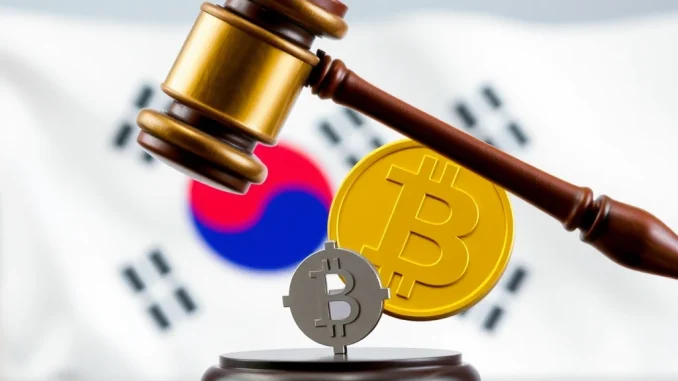
In a dramatic turn of events for the crypto world, a South Korean court has delivered a major blow to the Zebec Foundation. Their urgent plea to halt the delisting of their native ZBCN token from the prominent crypto exchange Bithumb has been firmly rejected. This decision sends ripples through the digital asset landscape, raising crucial questions about token listings, regulatory oversight, and the fate of ZBCN token holders. Let’s dive into the details of this developing story and understand what it means for you.
Why is Bithumb Delisting ZBCN Token? Unpacking the Crypto Exchange’s Decision
The core question on everyone’s mind is: why did Bithumb decide to delist ZBCN in the first place? While Bithumb hasn’t released an exhaustive public statement detailing all the reasons, crypto exchange delistings often stem from a variety of factors. These can include:
- Low Trading Volume: Exchanges like Bithumb need to maintain a certain level of trading activity to justify listing a token. If ZBCN’s trading volume has dwindled, it might become less profitable for Bithumb to support it.
- Regulatory Concerns: The ever-evolving regulatory landscape in South Korea, and globally, plays a significant role. If ZBCN or the Zebec Foundation faces increased regulatory scrutiny or compliance issues, Bithumb might preemptively delist to mitigate risks.
- Project Development and Activity: Exchanges monitor the ongoing development and activity of listed projects. Lack of updates, a stagnant ecosystem, or concerns about the project’s future can lead to delisting.
- Security and Technical Issues: Any vulnerabilities, security breaches, or technical problems associated with the ZBCN token or its blockchain could prompt Bithumb to remove it from their platform.
It’s important to note that Bithumb, like other major crypto exchanges, operates under its own set of listing and delisting policies. These policies are designed to protect users and maintain the integrity of the exchange. While the exact reasons for ZBCN’s delisting remain somewhat opaque, these are common factors in such decisions within the crypto space.
Zebec Foundation’s Uphill Battle: The Injunction and Court’s Dismissal
In a bid to prevent the delisting and safeguard the interests of ZBCN holders, the Zebec Foundation took swift action by filing an injunction with a South Korean court. An injunction is a legal remedy sought to prevent a particular action from taking place – in this case, Bithumb proceeding with the delisting of ZBCN. However, the court’s dismissal of this injunction is a critical setback for the Zebec Foundation.
What does this dismissal mean?
- Court’s Decision is Final (for now): For this particular legal challenge, the court has sided with Bithumb. This suggests the court found Bithumb’s decision to delist was within their rights, or that Zebec Foundation’s arguments for halting the delisting were not sufficiently compelling under South Korean law.
- ZBCN Delisting Likely to Proceed: Unless Zebec Foundation pursues further legal avenues (like an appeal, if possible), the dismissal of the injunction strongly indicates that Bithumb will proceed with the planned delisting of ZBCN token.
- Implications for ZBCN Holders: This news is undoubtedly concerning for those holding ZBCN tokens on Bithumb. Delisting from a major exchange typically leads to reduced liquidity, potential price drops, and challenges in trading the token.
It’s crucial to remember that legal proceedings are complex, and the court’s reasoning for dismissing the injunction would be based on specific legal arguments and evidence presented by both sides.
Impact on ZBCN Token Holders: Navigating the Crypto Delisting Aftermath
For ZBCN token holders on Bithumb, the immediate aftermath of this court decision and impending delisting can be unsettling. What steps should they consider?
- Understand the Delisting Timeline: Bithumb usually provides a notice period before a delisting takes effect. ZBCN holders need to be aware of these dates – when trading will cease, and when withdrawals will no longer be supported on Bithumb.
- Explore Alternative Exchanges: Is ZBCN listed on other crypto exchanges? If so, holders may consider transferring their tokens to these platforms to continue trading. However, liquidity and trading volume might vary significantly across different exchanges.
- Consider Off-Exchange Storage: For long-term holders who believe in the project, moving ZBCN tokens to a personal crypto wallet (non-custodial wallet) for secure storage might be an option. This gives you full control of your tokens, but you’ll need to manage your own security.
- Stay Informed: Keep a close watch on official announcements from both Zebec Foundation and Bithumb. They may provide further details, timelines, or instructions related to the delisting process.
- Assess the Project’s Future: Delisting from a major exchange is a significant challenge for any crypto project. ZBCN holders should re-evaluate the Zebec Foundation’s roadmap, community support, and overall prospects in light of this development.
The delisting process highlights the inherent risks in the crypto market and the importance of diversification and staying informed about the projects you invest in.
Korean Court and Crypto Regulation: Broader Implications for the Industry
This case involving Zebec Foundation and Bithumb unfolds against the backdrop of evolving crypto regulations in South Korea. South Korea has emerged as a significant hub for cryptocurrency trading and innovation, but also faces increasing regulatory scrutiny. This court decision could signal:
- Judicial Deference to Exchange Decisions: The court’s dismissal of the injunction might indicate a tendency to respect the operational and business decisions made by crypto exchanges, especially regarding token listings and delistings.
- Emphasis on Exchange Autonomy: It could reinforce the idea that exchanges have considerable autonomy in managing their platforms and deciding which tokens to support, within the bounds of existing regulations.
- Regulatory Clarity Needed: While the court decision provides insight into this specific case, the broader crypto industry in South Korea and globally still craves more comprehensive and clear regulatory frameworks. This clarity is crucial for both exchanges and projects to operate with confidence and compliance.
The Korean regulatory environment for crypto is dynamic, with ongoing debates and policy developments. This case serves as a reminder of the interplay between legal frameworks, exchange operations, and the fate of crypto projects.
What’s Next for Zebec Foundation and ZBCN Token?
The immediate future for Zebec Foundation and the ZBCN token appears challenging. While the court’s dismissal of the injunction is a setback, it’s not necessarily the end of the road. Potential next steps for Zebec Foundation could include:
- Appeal the Court Decision: Depending on the legal grounds and timelines, Zebec Foundation might consider appealing the court’s dismissal to a higher court.
- Engage in Discussions with Bithumb: Even after the legal setback, continued dialogue with Bithumb to understand their concerns and potentially address them could be valuable, although the likelihood of reversing the delisting at this stage may be low.
- Focus on Community and Development: Strengthening the ZBCN community, continuing project development, and showcasing the token’s utility and value proposition remain crucial. A strong project can potentially seek relisting on other exchanges or even Bithumb in the future if circumstances change.
- Transparency and Communication: Open and transparent communication with ZBCN holders is paramount. Keeping the community informed about the situation, future plans, and potential strategies is essential to maintain trust and support.
The crypto market is known for its resilience and ability to rebound. While the current situation is undoubtedly difficult for Zebec Foundation and ZBCN holders, strategic decisions and continued effort could pave the way for future opportunities.
In Conclusion: Navigating the Volatile Waters of Crypto Delistings
The Zebec Foundation’s legal battle against Bithumb’s delisting of ZBCN token and the subsequent court dismissal serve as a stark reminder of the volatile and often unpredictable nature of the cryptocurrency market. For investors, it underscores the importance of due diligence, risk management, and understanding the factors that can influence token listings and delistings on exchanges. For crypto projects, it highlights the need for robust compliance, continuous development, and proactive communication. The story of ZBCN and Bithumb is still unfolding, and its future trajectory will be closely watched by the crypto community as a whole. Stay tuned for further updates as this developing situation progresses.



